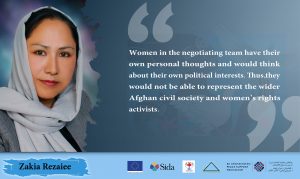Under the Shadow of Extremism

Although Bamyan has always been mentioned as one of the safest provinces in the country, especially for women, it seems that in some parts of the province, insecurity, and extreme ideology have become a serious problem for women and girls in this province. Zakia Rezaie, Bamyan’s Director of Women’s Affairs said that in some districts of the province, girls are not allowed to study above the primary school level. She added that about forty-seven percent of girls in Bamyan now attend school, but the number of dropout of female students in the high school level in some districts increases each year.
In an interview with the Civil Society and Human Rights Network (hereinafter referred to as “the Network”), the Director of Women’s affairs in Bamyan said that they have special programs of increasing girls’ participation in the education sector. But their programs are hampered by insecurity in some districts sometimes. “The Bamyan Department of Women’s Affairs, in cooperation with the Ministry of Education, is holding an annual campaign to increase the enrollment of girls in schools. We are making the necessary arrangements with security officials before the program is implemented, and if it is impossible to eliminate the risk, we do not often visit some of those insecure areas.”
The feeling of not being safe not only bothers women in insecure districts and villages of Bamyan, but it also troubles working women in unsafe working environments.
Network: What problems do Bamyan women have at work?
Rezaie: Some women complain about physical and psychological harassment. Also, due to the traditional structure of society, some offices are male-oriented making the working environment difficult for women. Moreover, women suffer from lack of facilities which are recognized as their rights in the law. For instance, there is no kindergarten in some offices for their children. Despite these challenges, women in Bamyan have achieved significant milestones in the fields of politics, economics, and sports following the Taliban’s fall in 2001. The presence of women as the heads of local authorities, microeconomic activities, participation in international sports competitions are some of the noticeable achievements of women.
Network: Given the problems and achievements of Bamyan women in various fields, what do they expect from the peace talks?
Rezaie: Women’s achievements in the past 20 years must be consolidated in particular their achievements in education, health, sports, and other sectors. Effective preventative measures to combat radicalization and violent extremism must be undertaken.
According to Ms. Rezaie with the current composition of the negotiating team, there will be no significant achievement. Women representatives in the negotiating team cannot represent women’s demands. “Every one of them has her own particular political views. There remain significant gaps to be filled and I do not think that the current composition can represent civil society and women’s rights activists because they are more focused on their own political interests.” She said that Afghan women’s problems can only be addressed when women from all walks of life have their say in the peace talks. Otherwise, with the current composition of the negotiating team, women will not witness desirable outcome.